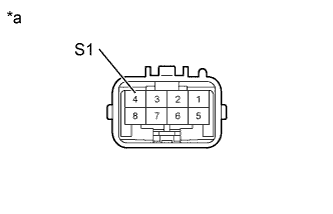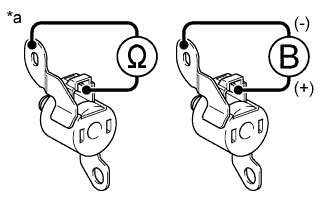Dtc P0973 Shift Solenoid A Control Circuit Low (Shift Solenoid Valve S1)
Drivetrain. Hilux. Tgn26, 36 Kun25, 26, 35, 36 Ggn25
DESCRIPTION
MONITOR DESCRIPTION
WIRING DIAGRAM
INSPECTION PROCEDURE
INSPECT TRANSMISSION WIRE (SHIFT SOLENOID VALVE S1)
CHECK HARNESS AND CONNECTOR (TRANSMISSION WIRE - ECM)
INSPECT SHIFT SOLENOID VALVE S1
DTC P0973 Shift Solenoid "A" Control Circuit Low (Shift Solenoid Valve S1) |
DTC P0974 Shift Solenoid "A" Control Circuit High (Shift Solenoid Valve S1) |
DESCRIPTION
Shifting from 1st to 4th is performed in combination with the on and off operation of shift solenoid valves S1 and S2, which are controlled by the ECM. If an open or short circuit occurs in either of the shift solenoid valves, the ECM controls the remaining normal shift solenoid valve to allow the vehicle to be operated safely. Also, the ECM stops sending current to the open or short-circuited solenoid (HILUX_TGN26 RM000000O8L0KVX.html).DTC Code
| DTC Detection Condition
| Trouble Area
|
P0973
| ECM detects a short in the solenoid valve S1 circuit 4 times when solenoid valve S1 is operated (1-trip detection logic).
| - Short in shift solenoid valve S1 circuit
- Shift solenoid valve S1
- ECM
|
P0974
| ECM detects an open in the solenoid valve S1 circuit 4 times when solenoid valve S1 is not operated (1-trip detection logic).
| - Open in shift solenoid valve S1 circuit
- Shift solenoid valve S1
- ECM
|
MONITOR DESCRIPTION
These DTCs indicate an open or short in the shift solenoid valve S1 circuit. When there is an open or short circuit in either shift solenoid valve circuit, the ECM detects the problem, illuminates the MIL and stores the DTC. When shift solenoid valve S1 is on, if its resistance is 8 Ω or less, the ECM determines there is a short in the shift solenoid valve S1 circuit.When shift solenoid valve S1 is off, if its resistance is 100 kΩ or higher, the ECM determines there is an open in the shift solenoid valve S1 circuit (HILUX_TGN26 RM000000O8L0KVX.html).
WIRING DIAGRAM
INSPECTION PROCEDURE
| 1.INSPECT TRANSMISSION WIRE (SHIFT SOLENOID VALVE S1) |
Disconnect the C92 transmission wire connector.
Measure the resistance according to the value(s) in the table below.
- Standard Resistance:
Tester Connection
| Condition
| Specified Condition
|
4 (S1) - Body ground
| 20°C (68°F)
| 11 to 15 Ω
|
Text in Illustration*a
| Component without harness connected
(Transmission Wire)
|
| 2.CHECK HARNESS AND CONNECTOR (TRANSMISSION WIRE - ECM) |
Disconnect the C96 ECM connector.
Measure the resistance according to the value(s) in the table below.
- Standard Resistance:
Tester Connection
| Condition
| Specified Condition
|
C96-21 (S1) - Body ground
| 20°C (68°F)
| 11 to 15 Ω
|
Text in Illustration*a
| Rear view of wire harness connector
(to ECM)
|
| | REPAIR OR REPLACE HARNESS OR CONNECTOR |
|
|
| 3.INSPECT SHIFT SOLENOID VALVE S1 |
Remove shift solenoid valve S1.
Measure the resistance according to the value(s) in the table below.
- Standard Resistance:
Tester Connection
| Condition
| Specified Condition
|
Shift solenoid valve S1 connector terminal - Shift solenoid valve S1 body
| 20°C (68°F)
| 11 to 15 Ω
|
Apply 12 V battery voltage to the shift solenoid valve and check that the valve moves and makes an operating noise.
- OK:
Measurement Condition
| Specified Condition
|
- Battery positive (+) → Shift solenoid valve S1 connector
- Battery negative (-) → Shift solenoid valve S1 body
| Valve moves and makes an operating noise
|
Text in Illustration*a
| Component without harness connected
(Shift Solenoid Valve S1)
|



